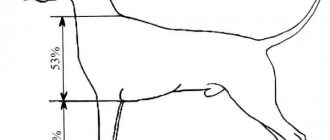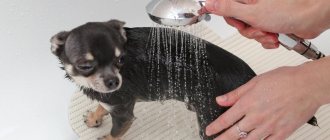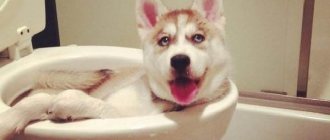How to choose the right puppy
Many even experienced dog breeders say that there is no single formula and purchasing a dog is always a lottery. At the same time, it is still worth focusing on a few simple rules so as not to get into trouble.
- It is better to buy a puppy from a specialized nursery or from experienced breeders. The market, no doubt, will be cheaper, but the quality of the animals, their physical condition and documents leave much to be desired. There are often cases of purchasing a cute puppy from the market with a bunch of additional sores, which will subsequently upset all family members. In addition, the breeder can tell you a lot about the puppy’s habits and the peculiarities of caring for this particular breed of dog.
- The dog must have a special puppy card with all the marks from the veterinarian. It is best to wait a little and pick up the animal with all its vaccinations. This will allow you to protect yourself and your new pet. If the chosen dog is a club and purebred dog, it should have a brand inside the ear and on the inner thigh. The brand, of course, should not be drawn with a marker; this is obvious fraud.
- It is better to pick up a puppy when it reaches 7-8 weeks. Externally, the dog should be well-groomed and well-fed. Eyes, nose, ears must be clean. The abdomen is clean without rash.
- Pay attention to the pedigree, mother and father of the puppy. Labrador is one of the most beautiful show breeds, and even if owners do not initially think about it, many later come to this idea. Do not hesitate to ask to show you photographs, tell in detail about what exhibitions your parents participated in, what prizes and titles they received.
CHOOSING A PUPPY - USEFUL TIPS
You have decided to buy a Labrador puppy... Congratulations - this is a great choice! How to choose the right puppy, given the variety of advertisements with the cost of Labrador Retriever puppies varying several times. How not to fall for the trick of a cunningly composed advertisement, photos of beautiful puppies stolen by an unscrupulous seller, but puppies of someone else's breeding. How to find a good and competent breeder who will always help with advice, and not a clearance agent or reseller. The Labrador Retriever breed is very popular, and where there is popularity, there are many fakes or low-quality goods. But you want to buy a good dog for yourself, for your children, for your family? Then my advice for you...
Advice: Sometimes I see in advertisements for sale beautiful stolen photographs of adult Labradors - ALLEGEDLY parents of puppies and ridiculous, low-quality photos of mixed-breed babies that look like Labradors or low-quality Labradors, more often just low-quality photos of puppies against the background of some kind of rag. The price for puppies is usually very low. There is no specific information in the ad. But any self-respecting nursery has a website that presents all the manufacturers and information about them, complete information about matings. Photos of the kennel puppies are always of good quality. Therefore, you can easily ignore cheap offers if you need a purebred puppy. If you just need a dog, then buying a low-quality or mixed-breed puppy will be a noble decision, because such babies also need a loving home... The main thing is that your step is meaningful and you do not receive further disappointment from the discrepancy between the external data and character of your friend to the breed standard Labrador Retriever. There are no miracles. A purebred puppy from excellent parents, especially from a foreign breeding, cannot be cheap.
Bulletin boards with offers, nursery websites, photos in which all the tiny puppies look like pretty buns with cute eyes, photo...advertisement...photo...advertisement...photo...advertisement... flash before the eyes of an inexperienced buyer and turn into a kaleidoscope. The buyer of the puppy does not remember the names of the nurseries, nor the nicknames of the puppies’ parents, nor what litters he is asking about - “PORRIDGE” is in his head! It happens that the buyer does not know what breed of puppy he wants to buy - a Labrador Retriever or a Golden Retriever! And why? “You’ll break your tongue to pronounce.” The buyer gets tired of listing the titles of the puppies' parents and ancestors. The words “show class”, “elite”, “scheduled mating”, “unplanned mating”, “super”... “the best” are dazzling in my eyes. What other “tests for dysplasia” and “PRA”?
A difficult task for a beginner...
Advice: look on the Internet before calling the nursery, specify what breed you want to buy and what color. It is difficult to talk with a buyer who does not know what he wants in principle - the breed of dog, gender, color. “Unscheduled” and “planned” matings do not exist. This is a lie. Planned matings took place in the USSR, where there was one kennel club, when puppies received pedigrees from matings produced according to the PLAN of the head of the breed club. This phenomenon has not happened for a long time. If we are talking about an allegedly “unscheduled mating”, expect a catch. And in general, breeders do not use such terms. The tests will be discussed below.
Often, the sale of puppies seems like a bazaar, where goods are ranked solely by price, and breeders (or breeders) dangle pedigrees and titles in front of the buyer’s nose (sometimes the title of a great-great-great-great-great-grandfather, because there is nothing else, but you also want to shake ) and tests in which the buyer does not understand anything. Or, on the contrary, they don’t shake anything, but modestly keep silent about their absence, or even worse, they tell the buyer that tests that determine the health of dogs are complete and useless nonsense.
Advice: the advertisement of a good nursery will never be pretentiously flashy. It will indicate the names of the parents, briefly their titles, tests and mention the breeding value or special breeding value if the litter is from foreign mating, from outstanding or interesting in the breeding sense sires.
An ordinary buyer - a beginner - does not understand anything about titles and tests, does not know whether they are needed, and if they are needed, then why, he just wants to buy a dog. In the best case, he will list phone numbers on the Internet and, after calling, ask if there is a black boy or a fawn girl or a “chocolate puppy.” Conduct “marketing” research. Then, from the puppies selected by gender and color, he will most likely pay attention to those who are “cheaper or closer.” After all, he needs the dog “for himself” and he doesn’t see the point in overpaying for his parents’ titles, but it’s possible without a pedigree at all, or even with marriage. And having come to see the litter, and seeing that the puppies in reality are not very good and are not kept in the best way, she will still buy a puppy. It's a pity...
Advice: the criteria for choosing a puppy - the litter is located “closer to home” and “cheaper for us, for ourselves” - are the most unfortunate possible. In St. Petersburg, there are very few nurseries/breeders involved in breeding Labrador retrievers at a good level, with mandatory participation in exhibitions and testing of producers - the fingers of one hand are enough... And I don’t understand why buyers are so unfair to themselves that they often choose for themselves the frankly NOT best or they naively believe that the work of the nursery and the price of a Labrador puppy do not affect its quality and breed temperament.
Although maybe you’ll be lucky... maybe... And in general, who is a breeder? Lots of dogs... You don't even need to address him by name. Manufacturers without a name and tests, a breeder without a name and the puppy will most likely be with the prefix “without-”. Sometimes it seems to breeders that a puppy with a defect is one of the most sought-after positions when selling puppies. It seems that the good work of the breeder and high-breed animals are not needed by buyers. As a result, we get that such demand generates similar supply - low-quality puppies from parents who have not been tested for health and ill-conceived matings, the ultimate goal of which is to make a profit.
Tip: Write down the litters you are interested in, the puppies' parents and colors, and contact the breeder by name to avoid confusion. A good breeder, if he feels disrespect for himself and his work, will not sell you a puppy, he will structure the conversation in such a way that you will not buy a puppy from him, I assure you! Not only you choose breeders, owners are also chosen...
I do not want to discuss here the policy of the RKF, which in no way licenses or filters the massive flow of puppies from breeders. In Russia there is no licensing or mandatory tests for manufacturers. We can only hope that over time in our country the attitude towards animal reproduction will become more serious...
Examples of advertisements from an unscrupulous reseller or breeder:
- “Labrador, any region (RUB 15,000) I will sell puppies 1.5 months old, vaccinated according to age, black and fawn, there is also a reservation for chocolate ones (3 boys and 2 girls), documents, brand, large, bony, all tests from parents have been passed , assistance in growing and consultations are free.
- “The cable is from Kamchatka, Russian champion. The puppies are now ready to be picked up! The puppies are beautifully colored, have good bones, there are some fawn colors left.”
- “Unscheduled, vaccinated. Black Labrador puppies, one and a half months old, first vaccination given - club puppies with documents without defects or defects, the price for boys is 12,000 rubles, and for girls 10,000 rubles.”
“A professional nursery offers boys and girls with vaccinations and documents. Black and fawn. There are alimony puppies with the chocolate gene. 2 months and 1 month."
- There are two girls and a boy. Color - fawn. SELECTIVE BREEDING! With pedigree and all documents. Parents are champions! We went to exhibitions.”
But what should the future owner of a Labrador Retriever do, who is not a breed specialist, a dog trainer, and who still finds it difficult to understand the flow of offers for puppies, but who wants to make the most correct choice?
Firstly,
You need to be patient and understand that choosing a puppy will take some time, and you may need to wait until your puppy is born if there are no offers available at the time of your search that will meet your goals.
Secondly,
you need to think and determine for what purpose you are buying a puppy:
-just want to get a dog;
-would you like a purebred, beautiful dog?
-You would like the best puppy in the litter and are ready to show it at an exhibition and participate in breeding with it.
Depending on your ambitions and expectations, the ambitions of the breeder and the funds invested in the litter, the price of a puppy can vary significantly and vary by 2-3 times. The cost of a decent Labrador puppy in St. Petersburg averages $1000 -1000 euro. The cost of puppies from foreign matings can be significantly higher. Please note that in one litter, even an exclusive one, the price may vary depending on the prospects of the puppies in the exhibition plan. Basically, puppies are purchased as pets (a dog “for yourself”), at a more attractive price, but in any case you need to take your choice responsibly and find a quality litter, since you are choosing a new family member for 10-15 years, and not a toy for a short time. It is important to remember that you have the right to purchase a healthy dog with a good pedigree, pedigree appearance (exterior), which will delight you with its temperament - that is, a good puppy, even if this puppy is “for yourself” and you do not plan to attend exhibitions with it.
As a rule, the buyer will always be warned if the breeder particularly likes the puppy for its appearance and would like to see it at dog shows.
Third,
muster your willpower and still find out what pedigree and tests the puppies' parents have. Point three will be the subject of my further conversation in the article SELECTION OF MANUFACTURERS.
Elena Zaitseva(c) 2012
You can also read articles:
CHOOSING A BREED
SELECTION OF MANUFACTURERS - all about pedigree and tests
How to determine if a puppy is a purebred Labrador
There are 3 main indicators of this breed:
- wool,
- tail,
- facial expression.
When standing, the dog must be well balanced. The tail is straight. It is thick at the base and should taper towards the middle.
Labradors have a wide head, the transition from the forehead to the nose is well defined, and the eyes are set far apart.
Even a small puppy’s coat should not be sparse, the outer layer should be hard and even rough to the touch, the undercoat should be dense, but soft and silky.
What should be most confusing is the lack of undercoat or very long hair. If so, most likely you are not looking at a purebred Labrador.
Choosing a nursery
You should buy a dog second-hand only if by doing so you will save its life. Otherwise, it is better to avoid bird markets and private advertisements for sale on the Internet.
Important! When purchasing a dog from a kennel, you can be sure that the animal is directly related to the breed. Breeders who value their reputation not only provide the opportunity to get acquainted with pedigrees, but also help their clients with advice on education, care and maintenance.
Good breeders love their dogs, and don't be surprised if they start checking and testing you too. It is extremely important for a responsible kennel owner, who does his business not only for the sake of money, to understand that he is leaving the puppy in truly good hands.
Girl or boy?
Both girls and boys make excellent companions. However, the nature and content of representatives of different sexes have their own characteristics, which should be taken into account when choosing.
Boys are usually bred for show careers, hunting or search and rescue. They do not go into heat, have no forced breaks for pregnancy and caring for their offspring.
However, males have a more obstinate disposition - it will be more difficult for novice dog owners to cope with them. When meeting a female in heat, boys lose their composure and can run away after the “lady” they like.
Girls are usually more flexible. They have a developed maternal instinct, so they become excellent nannies for their master's children. Thanks to their calm nature, they are easier to train - they do not strive to take a leadership position and obey all family members.
The owner of the girl will have to come to terms with regular estrus, which occurs twice a year. And although Labradors are very clean, during this period the female may accidentally stain furniture or things.
To avoid unwanted pregnancy, during heat the dog will have to be kept on a leash during walks and pushy suitors will have to be driven away from it. If the owner decides to have offspring, he will need to find a worthy “groom”.
For your information. During pregnancy and after childbirth, females need special care, which requires some experience and skills.
It should be remembered that every dog is individual. Among boys there are calm and gentle individuals, and among girls there are cocky and wayward ones. Therefore, it is simply impossible to answer unequivocally in favor of whom to choose.
Labrador retriever puppy age. When is the best time to take it?
According to the rules of the RKF (Russian Cynological Federation), puppies receive documents from 45 days. Starting at this age, they are ready to move to their owners.
What age is best to adopt a Labrador puppy is a question that is asked quite often. First of all, let's figure out who is better for - for the puppy or for the owners?
Physiologically, from the age of 35 days, the puppy is able to feed independently and not depend on the mother. But taking such a small puppy is not only wrong, but also criminal. After all, this disrupts his natural psychological development and socialization.
Based on the psychological maturity of the puppy, the best weaning age is 7 weeks. By this age, the period of socialization in dog society ends.
To quote D. Fisher, “The main function of this period of socialization in dogs is for the puppy to learn how to regulate his bite force, communicate with other dogs, establish a hierarchy, and, also vitally important, he comes into contact with a person. Breeders should regularly pick up puppies, gently turn them over, check eyes, ears, teeth, paws, etc. By doing this, they not only give the puppies a pleasant human experience, they also expose the puppies to mild stress, which will help them build resilience to stress later on. Puppies that are given the opportunity to complete this period in the company of their mother and other puppies, constantly feeling warm and protected, and, in addition, gain experience in contact with people, usually grow up to become well-adjusted adult dogs.”
E. N. Mychko identifies the following stages of development - up to 8 weeks, the imprinting period. The puppy remembers the image of its species, the person, and is maximally open to the world around it. The social concept “WE” is being formed. This first period coincides with the stage of individuality formation; it occurs between the ages of 6 weeks and 5 months. The puppy becomes aware of its own “I”. His research activity and independence are increasing.
It turns out that the best age for a puppy to change its place of residence is 8-9 weeks. It is better to take a puppy at this age, since it will be easier for him to get used to new circumstances and will be “tied” to the owner more than an older puppy.
What's best for the owners? It's individual. Everyone has different capabilities. Of course, raising your dog from a 45-day-old “baby” is a great joy and happiness. A small Labrador puppy easily gets used to a new environment, quickly learns its social status and, importantly, sleeps a lot. As they grow older, their periods of wakefulness become longer, so the older the puppy, the more attention they require. You also need to take into account that a puppy of this age needs 4-5 feedings a day and regular communication with people. If the baby is left alone during the working day, you should think about purchasing a grown-up puppy - from 3 months. At this age, 3 feedings a day are sufficient. And the foundations of education and social relations will already be laid by the breeder. But here you need to take into account that breeders are different, and the conditions in which the puppy will grow up will certainly be reflected in its character. By 5 months, the puppy is already a fully formed personality, with its own individual traits and habits that can be adjusted, but not changed. Therefore, when you decide to get a Labrador Retriever puppy, first of all, look for a good breeder!










